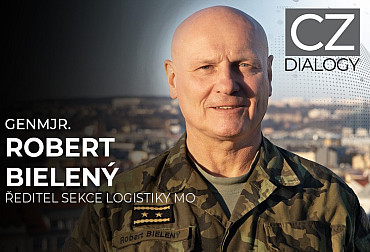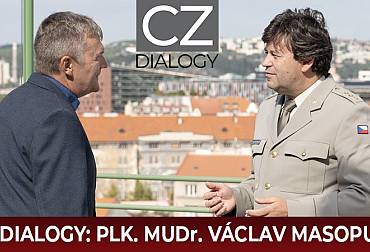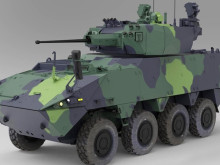Pavel Švagr: Greater interconnection of the army, the Ministry of Defence and the ASMR is logical
The Administration of State Material Reserves (ASMR) is the central state administration body for economic measures in crisis situations and for state material reserves. Recently, we have heard about it, for example, in the context of the covid-19 pandemic, and this summer, in connection with the fact that this institution provided bridge structures for flood-affected Slovenia. The Administration of State Material Reserves is also involved in providing humanitarian aid abroad. It has been headed since 2014 by Pavel Švagr, who recently defended his mandate for the next 5 years in a tender launched by the Ministry of Industry and Trade. In the next episode of our discussion programme CZ DIALOGUES, we discussed the position of ASMR within the defence strategy, its ability to respond to potential threats, etc. with Pavel Švagr, the chairman of ASMR.
Video: Interview with Pavel Švagr, Chairman of ASMR / CZ DEFENCE
"State material reserves are available to every country in the world, because state material reserves, as reserves, are the last thing that should serve the citizens of a given state in crisis situations," says Pavel Švagr, adding that there are various forms of stockpiling. "If we talk about the Czech Republic, in principle, more emphasis was placed on state material reserves after the Second World War, approximately from 1959. Formally, the Administration of Material Reserves was established in 1969," Švagr adds. An important milestone was the establishment of the independent Czech state, when the independent Czech State Material Reserves Administration was created. "Both the Czech Republic and Slovakia have a lot in common in terms of the approach and the structure of the state material reserves, and I remind you of the bridge provisionals that were produced in the period from the 1950s to the mid-1980s," continues the chairman of the ASMR.

Of course, the composition of the state material reserves changes over time according to new challenges and realities. "On the one hand, the reserves have an ageing process, on the other hand, they need to be modernised and renewed after crises. So even today, the structure of the state material reserves changes over time. But of course some stalwarts have to be maintained. These are, for example, the aforementioned bridge provisions. This is logical, because bridge provisioning is useful, say, in emergency situations, for example for the army," explains Pavel Švagr.
The state material reserves consist of a wide group of items. Consider, for example, power generators or various metals, raw materials such as grain, butter, dairy products, meat and meat products, lentils or rice. Of course, the issue of medical preparedness cannot be overlooked. Important items are therefore beds, humanitarian aid, food banks, hygiene items or medical supplies.

Oil and petroleum products are an important area, but also suction dredgers, pumps and water tankers or various salvage equipment. For the army, these are mobilisation reserves. "It's a really broad group of items and the aim is to be prepared in principle for all sorts of potential emergencies that may arise. We, as the State Material Reserve Administration, do not define these crises, but they are also defined by individual ministries. At the moment, there are 22 standard plans of decisive documents on which the requirements of individual ministries for the acquisition of state material reserves are based. In the past, there was quite a big debate about the pandemic plan," Pavel Švagr calculates the number of items the ASMR has at its disposal.

The Crisis Act applies different crisis states and the readiness of the State Material Reserve Administration is based on the requests it receives from the ministries. And these are indeed tense moments. "In 2019, we tested about a month-long oil shutdown. Today it is useful for us because we know what it would mean if by chance the Druzhba pipeline stops working in connection with the Ukrainian crisis. Then came the covid. This was a difficult and interesting test for the entire apparatus of the State Material Reserves Administration. As soon as the covid was over, I thought that it would finally be time to prepare strategic debates, strategic decisions and legislative adjustments. And then Ukraine came along again, so we are practically always in it. In terms of preparedness, we don't even have to exercise. We have experienced these crises in practice, and it is not only the top management of the administration, but it is of course also our warehouses, because the staff in our warehouses are also prepared for crises thanks to this practice. We are able to remove things very quickly," says the ASMR chairman.
As tensions are rising not only in Europe, new questions arise about the creation of strategic stocks for the defence industry that should be available in the event of a national emergency. According to Pavel Švagr, this will be a long debate as the military continues to develop its requirements and its war preparedness mechanism. "I think that today we are in the fortunate situation where the army has fixed its share of GDP at 2 percent, so it will know in the long term what items it can acquire and will be financially set for them as well. As far as we are concerned, based on a government decision, the budget of the State Material Reserves Administration is included as part of defence expenditure. We are therefore starting to get even closer to the army and to the debate around the army and around the individual items. There will be new demands, because there will certainly be a need to acquire a number of items in connection with war preparedness," says Pavel Švagr, recalling the period when he took office in 2014. And we were selling quite a lot of assets that were unnecessary for the administration. And that included ammunition depots. It was also the material warehouses of the State Material Reserve Administration, where the material was no longer there, but it was also the actual buildings that were in several defence industry enterprises, for example in Tatra or some others. I think that we are approaching a period when we are returning to a state where it will be necessary to activate the preservation of production capabilities to a much greater extent than before, when it will be necessary to think to a much greater extent about the interconnection of the defence industry and the State Material Reserves Administration for the benefit of the army, for the benefit of emergency preparedness."
This year, two strategic documents were adopted - the Defence Strategy and the Security Strategy of the Czech Republic, in the preparation of which ASMR participated. "It's about greater interconnection between the army, the Ministry of Defence and the State Material Reserves Administration and it's logical," says Švagr.

We wondered whether there can be international cooperation in the area of material gaps between neighbouring countries and we learned that it works, for example, between the V4 countries. "The cooperation with Slovakia is absolutely great, because at the beginning of the administration we had common parents and by separating, both countries have, give or take, the same structure of what they had from the past. We have managed to establish a very good cooperation in Poland. I am, in fact, jealous of the Poles, because they have made a huge leap in recent years, both in terms of transport infrastructure and in terms of crisis preparedness, and their preparedness for crisis situations is somewhere else compared to the Czech Republic, including the legislative situation. Poland is really a great example for us. As far as Germany is concerned, we have established contacts there as well. A delegation from Austria will be arriving before the end of the year. We had a delegation from Romania. We have mapped out Finland. I would say that we have established cooperation with a number of countries, and we are expanding our cooperation. But there is one problem - each country protects its own area of state reserves, including in terms of information," Pavel Švagr, chairman of the State Material Reserves Administration, said on the CZ DIALOGUES programme. If you want to learn more, listen to the full interview at the beginning of this article.






















